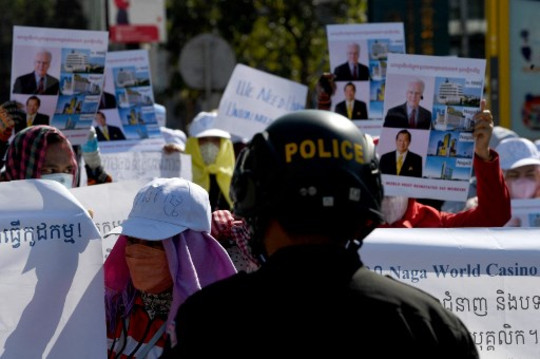According to Radio Free Asia, journalists were blocked from covering the transportation of striking LSRU workers to a quarantine facility in Phnom Penh on February 24, with police officers spraying the journalists’ equipment with hand sanitiser.
The journalists were subsequently banned from reporting on incidents of sexual assault by police officers towards the workers, many of whom were women.
In one incident “a male officer grabbed and squeezed the breast of one woman while she was being forced onto a bus”, a joint statement, released by a collective of Cambodian trade unions and civil society groups, said.
Members of the LRSU have been striking from the hotel and casino NagaWorld since December 2021, with workers staging a walk-out to demand higher wages and the reinstatement of arrested union leaders.
This is not the first incident of authorities preventing journalists from reporting on LRSU labour strikes. On February 5, a foreign journalist, employed by the Cambidan Center for Independent Media (CCIM)’s news outlet VOD, was intimidated and threatened with arrest whilst covering interactions between authorities and NagaWorld protesters.
Cambodia has been the subject of international scrutiny from human rights groups and press freedom organisations since the announcement of its new National Internet Gateway (NIG) in 2021, intended for launch on February 16, 2022, but postponed due to the ongoing Covid-19 crisis.
The Cambodian Journalists Association have denounced the NIG, calling on the government to discard the new gateway claiming that it "violates Cambodia’s international human rights obligations and its Constitution, by threatening human rights online and offline in Cambodia, particularly the rights to freedom of expression, access to information, and privacy."
The NIG will give the Cambodian government unprecedented power to monitor all online activity, censor communications, and collect user data. Controlled by a government-appointed regulator, the NIG will support authorities to “measures to prevent and disconnect all network connections that affect national income, security, social order, morality, culture, traditions, and customs.”
“It threatens to curtail free speech, access to information, and privacy rights in Cambodia, and gives the government unprecedented authority to monitor and control all internet traffic in the country,” said Naly Pilorge, deputy director of the Cambodian League for the Promotion and Defence of Human Rights (LICADHO).
Nop Vy, executive director of CamboJA, said: "We call Cambodian government to pay more attention and respecting to press freedom, especially provide full of protection and stop barring journalists from exercising their rights and freedom".
The IFJ said: “The authorities’ move to block journalists from reporting on the alleged harassment, detainment and sexual assault of peaceful LSRU strikers is a deliberate attempt to further stifle press freedom in the country. The IFJ condemns the continued impediment and harassment of independent journalists in Cambodia.”

